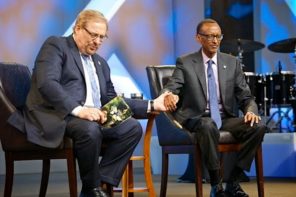Ugandan gay rights activists believe the police and government officials are using the brutal murder of gay rights activist David Kato as an excuse to again whip up support for an anti-homosexuality bill (so severe that it dictates imprisonment, and even execution for the ‘crime’ of homosexuality) still pending in Parliament.
Kato was beaten to death in January in his home in Uganda. Police now say the suspect, Nsubuga Enock, was Kato’s lover and he beat him to death after Kato failed to produce the house and car he had promised him in exchange for sex.
The story is “totally absurd,” according to Julius Kaggwa, a Ugandan native and a leader in the Kampala-based Civil Society Coalition on Human Rights and Constitutional Law.
“Shortly after we buried David, Bahati (the sponsor of the anti-homosexuality bill) issued a statement saying, ‘This is the gay violence we have been talking about,’” Kaggwa said in an interview with Religion Dispatches. “There is a correlation there between this very convenient confession by this guy and this statement.”
Little Basis for Trust
Kaggwa and other LGBT activists have little motivation to believe the police, says Paul LeGendre, of Human Rights First in New York City.
“The police are not particularly trustworthy,” LeGendre said. “I think it will be hard to truly believe any conclusion that they make in the end. There isn’t a history of trust between the LGBT community and the police.”
LeGendre said his organization had urged the Ugandan police to seek out international law enforcement support in their investigation to ensure the credibility of their findings. Their refusal to do so, coupled with the glaring silence of top Ugandan officials after the murder has done nothing to quell the fear of those in the LGBT community in Uganda.
What Kaggwa and LeGendre know for sure is that Kato’s death is now being used to whip up new pressure to pass the internationally-condemned “kill the gays” bill.
“We’re not sure of anything, but if you look at everything that preceded (Kato’s) death you can’t help thinking that this is a conspiracy of some sort, or it is being used to reignite greater hostility in the public around this issue to support the bill,” Kaggwa said.
LeGendre points out that even if the bill is reintroduced in the next several months, as Bahati has promised to do, just the discussion of the bill has been the source of great violence in Uganda. That violence, he believes, has led to anyone who may oppose the most inhumane parts of the bill from speaking out for fear of being seen as supporting homosexuality.
Both LeGendre and Kaggwa acknowledge that homophobia has long been a way of life in Uganda, but that the fear and violence has increased since religious leaders from the United States arrived to preach against the special evil of homosexuality.
“Homophobia has been here for ages, but it was not to the extent it has become. People just had their own opinions. They frowned upon homosexuality but we never had this kind of violence, and blatant hate speech in the media like with Rolling Stone—to kill people,” Kaggwa said.
Words Do Matter
Kaggwa blamed “moralistic evangelicals” from the United States for fueling much of the hate speech and framing this as a “spiritual war.”
“They may not have killed David but they have started the process by planting hatred and planting lies,” he said.
As Reverend Gene Robinson, the Episcopal Church’s first openly gay bishop, recently wrote in response to Kato’s murder:
Words do matter. While American conservative Christians feign shock that their words would lead to such draconian laws it’s not nearly enough when their influence means that every moment of every day, members of Uganda’s LGBT community fear for their lives.
Kaggwa stresses that it is imperative for international pressure to remain on Uganda’s leaders to reject the “kill the gays” bill. It is also crucial that Christians who support LGBT rights continue to speak out. However, he believes to be successful much of the outrage against the bill and the violence it has prompted must come from inside Uganda. He hopes that Kato’s death will spur more people to speak out, and even if it doesn’t, it has fueled his own passion—despite his own fears—to make Uganda a safe place for LGBT people.
“We are dead scared. But if we do not stand our ground then how many more deaths will occur?”




